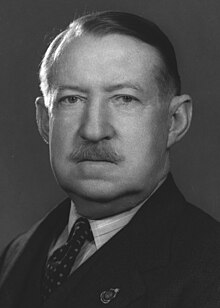Herbert Collett
Herbert Collett | |
|---|---|
 Collett in 1940 | |
| Senator for Western Australia | |
| In office 6 April 1933 – 30 June 1947 | |
| Preceded by | Hal Colebatch |
| Personal details | |
| Born | 12 November 1877 St. Peter Port, Guernsey |
| Died | 15 August 1947 (aged 69) Mount Lawley, Western Australia |
| Resting place | Karrakatta Cemetery, Perth |
| Nationality | English Australian |
| Political party | UAP (1931–44) Liberal (1944–47) |
| Occupation | Librarian |
| Military service | |
| Allegiance | Australia |
| Branch/service | Citizens Military Force Australian Imperial Force |
| Years of service | 1894–1927 |
| Rank | Colonel |
| Commands | 13th Brigade (1921–27) 22nd Brigade (1920–21) No. 2 Command Depot (1918–19) 4th Training Brigade (1916–17) 28th Battalion (1915–16, 1917–18) 11th Australian Infantry Regiment (1908–15) |
| Battles/wars | |
| Awards | Companion of the Order of St Michael and St George Distinguished Service Order Mentioned in Despatches Volunteer Officers' Decoration |
Herbert Brayley Collett CMG, DSO, VD (12 November 1877 – 15 August 1947) was an Australian politician, librarian and soldier. He was a Senator for Western Australia from 1933 to 1947, representing the United Australia Party (UAP) until 1945 and then the Liberal Party. He held ministerial office in the Menzies and Fadden governments from 1939 to 1941.
Early life
[edit]Collett was born in St. Peter Port, Guernsey and arrived with his family in Western Australia in October 1884. He was educated at Perth Grammar School and became a librarian at the Victoria Public Library in 1891. He married Anne Whitfield in April 1904.[1]
Military service
[edit]Collett joined the Metropolitan Rifle Volunteers at the age of 16 and rose to command the 11th Australian Infantry Regiment as a lieutenant colonel in 1908. With the outbreak of the First World War he commanded the 28th Battalion of the Australian Imperial Force from 23 April 1915 and he served at Gallipoli, in Egypt and Sinai and in France. On 29 July 1916, he was wounded at the Battle of Pozières. He returned to action on 12 October 1917 at the First Battle of Passchendaele. He was promoted to colonel in June 1918 and discharged in September 1919. He was mentioned in despatches and was made a Companion of the Distinguished Service Order in 1917, a Companion of the Order of St Michael and St George in 1919 and was promoted brevet colonel.[1]
Collett was assistant general secretary of Perth's amalgamated library, museum and art gallery from 1915 to 1933 and president of the Western Australia branch of the Returned Sailors and Soldiers' Imperial League from 1925 to 1933.[1]
Political career
[edit]In April 1933, Collett was appointed to fill a casual vacancy in the Australian Senate, representing the United Australia Party.[2] In parliament he was particularly concerned with military matters and benefits for ex-servicemen and was Minister in charge of War Service Homes from April 1939 to June 1941, when he became Minister for Repatriation until the fall of the Fadden government in October 1941. He was also Vice-President of the Executive Council and Minister in charge of Scientific and Industrial Research from August to October 1940. He was defeated at the 1946 election, completing his Senate term in July 1947. Shortly after he died of heart disease, survived by his wife and two sons.[1][3]
Notes
[edit]- ^ a b c d Black, David (1981). "Collett, Herbert Brayley (1877–1947)". Australian Dictionary of Biography. Canberra: National Centre of Biography, Australian National University. ISBN 978-0-522-84459-7. ISSN 1833-7538. OCLC 70677943. Retrieved 13 January 2008.
- ^ "Members of the Senate since 1901". Parliamentary Handbook. Parliament of Australia. Archived from the original on 6 September 2007. Retrieved 13 January 2008.
- ^ Black, David. "Colbert, Herbert Brayley (1877-1947)". The Biographical Dictionary of the Australian Senate. Retrieved 21 December 2022.
External links
[edit]
- 1877 births
- 1947 deaths
- Australian Army officers
- Australian military personnel of World War I
- Australian Companions of the Distinguished Service Order
- Australian Companions of the Order of St Michael and St George
- Liberal Party of Australia members of the Parliament of Australia
- Members of the Australian Senate
- Members of the Australian Senate for Western Australia
- Members of the Cabinet of Australia
- Nationalist Party of Australia members of the Parliament of Australia
- United Australia Party members of the Parliament of Australia
- People from the Bailiwick of Guernsey
- Guernsey emigrants to Australia
- Burials at Karrakatta Cemetery
